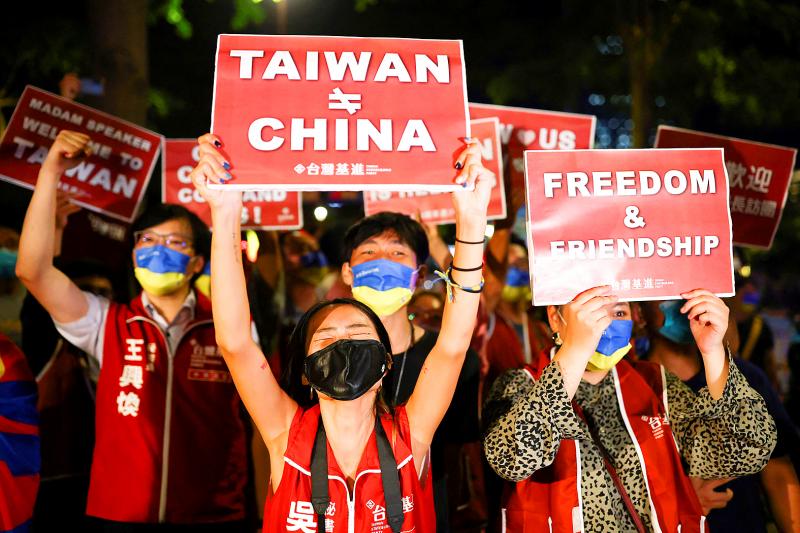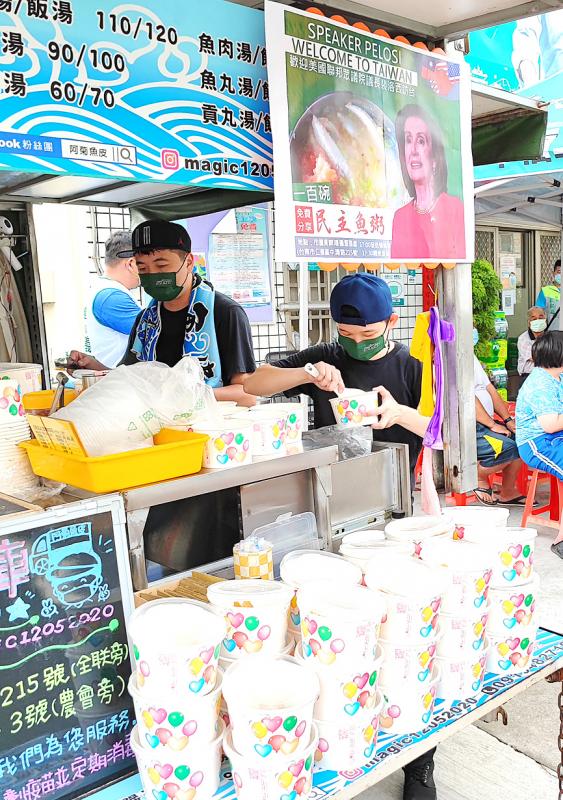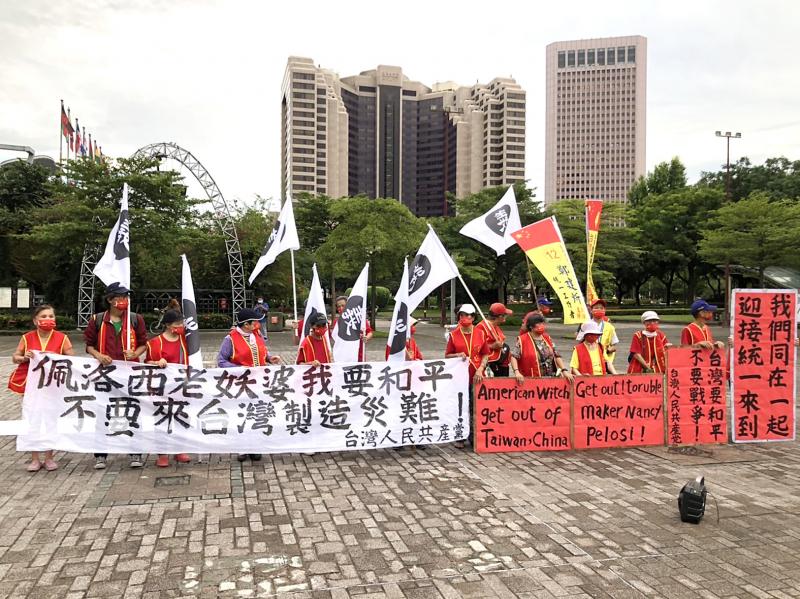Legislators across party lines yesterday welcomed US House of Representatives Speaker Nancy Pelosi to Taiwan, marking the first time in 25 years that an incumbent US House speaker has visited the nation.
Democratic Progressive Party (DPP) Legislator Hsu Chih-chieh (許智傑) cited the Chinese Nationalist Party’s (KMT) support for Pelosi’s visit — including from senior party members KMT Chairman Eric Chu (朱立倫) and former president Ma Ying-jeou (馬英九) — as evidence that President Tsai Ing-wen’s (蔡英文) foreign diplomacy is on the right course.
Pelosi’s visit has special meaning for Taiwan and the Indo-Pacific region as a whole, DPP Legislator Wang Ting-yu (王定宇) said.

Photo: Reuters
The visit marks a high point in Taiwan-US relations, Wang said, adding that it underscores the failure of China’s oppressive policies and, more importantly, its strategy against Taiwan and the US.
Pelosi’s visit, especially in the face of Chinese pressure, reinforces the idea that the US is reliable and credible among democratic nations in the Indo-Pacific region, Wang said.
Taiwan welcomes visits from its friends, but urges Washington and Beijing to restrain themselves and respect the autonomy of the Republic of China, KMT Legislator Johnny Chiang (江啟臣) said.

Photo: Wu Chun-feng, Taipei Times
Taiwan should not be a chip on the table in the great game of the US-China conflict, he said, urging visiting US friends to heed Taiwan’s call for more substantial acts of support.
The signing of a bilateral trade agreement, Taiwan joining the Indo-Pacific Economic Framework for Prosperity or being a part of upcoming Rim of the Pacific exercises would all be welcome news, Chiang said.
The Taiwan People’s Party (TPP) also welcomed Pelosi and looks forward to substantial improvements in Taiwan-US relations, TPP caucus convener Chiu Chen-yuan (邱臣遠) said.

Photo: Tu Chien-jung, Taipei Times
The first visit by a US House speaker in 25 years would be a conclusive sign that the US government and its people support Taiwan’s democracy, Chiu said.
Pelosi’s visit shows that Chinese pressure tactics would not impede US support for Taiwan, New Power Party legislative caucus convener Chiu Hsien-chih (邱顯智) said.
It shows that the White House is starting to adjust its policies and outright US support for Taiwan would become the new consensus, Chiu Hsien-chih said.
Meanwhile, Japanese-language Sankei Shinbun Taipei office head Akio Yaita said that Pelosi’s overnight stay in Taipei was a significant breakthrough for Taiwan’s diplomacy, adding that Japanese politicians could observe the same model for visits.
If China failed to stop Pelosi’s visit to Taiwan, it would have no leg to stand on to prevent Japanese politicians from visiting Taiwan, Yaita added.
Additional reporting by Chen Yu-fu and CNA

The Grand Hotel Taipei on Saturday confirmed that its information system had been illegally accessed and expressed its deepest apologies for the concern it has caused its customers, adding that the issue is being investigated by the Ministry of Justice Investigation Bureau. The hotel said that on Tuesday last week, it had discovered an external illegal intrusion into its information system. An initial digital forensic investigation confirmed that parts of the system had been accessed, it said, adding that the possibility that some customer data were stolen and leaked could not be ruled out. The actual scope and content of the affected data

‘LIKE-MINDED PARTNER’: Tako van Popta said it would be inappropriate to delay signing the deal with Taiwan because of China, adding he would promote the issue Canadian senators have stressed Taiwan’s importance for international trade and expressed enthusiasm for ensuring the Taiwan-Canada trade cooperation framework agreement is implemented this year. Representative to Canada Harry Tseng (曾厚仁) in an interview with the Central News Agency (CNA) said he was increasingly uneasy about Ottawa’s delays in signing the agreement, especially as Ottawa has warmed toward Beijing. There are “no negotiations left. Not only [is it] initialed, we have three versions of the text ready: English, French and Mandarin,” Tseng said. “That tells you how close we are to the final signature.” Tseng said that he hoped Canadian Prime Minister Mark Carney

POSITIVE DEVELOPMENT: Japan and the US are expected to hold in-depth discussions on Taiwan-related issues during the meeting next month, Japanese sources said The holding of a Japan-US leaders’ meeting ahead of US President Donald Trump’s visit to China is positive news for Taiwan, former Japan-Taiwan Exchange Association representative Hiroyasu Izumi said yesterday. After the Liberal Democratic Party’s landslide victory in Japan’s House of Representatives election, Japanese Prime Minister Sanae Takaichi is scheduled to visit the US next month, where she is to meet with Trump ahead of the US president’s planned visit to China from March 31 to April 2 for a meeting with Chinese President Xi Jinping (習近平). Japan and the US are expected to hold in-depth discussions on Taiwan-related issues during the

President William Lai (賴清德) yesterday bestowed one of Taiwan’s highest honors on Saint Vincent and the Grenadines (SVG) Ambassador Andrea Clare Bowman in recognition of her contributions to bilateral ties. “By conferring the Order of Brilliant Star with Grand Cordon on Ambassador Bowman today, I want to sincerely thank her, on behalf of the Taiwanese people, for her outstanding contribution to deepening diplomatic ties between Taiwan and SVG,” Lai said at a ceremony held at the Presidential Office in Taipei. He noted that Bowman became SVG’s first ambassador to Taiwan in 2019 and